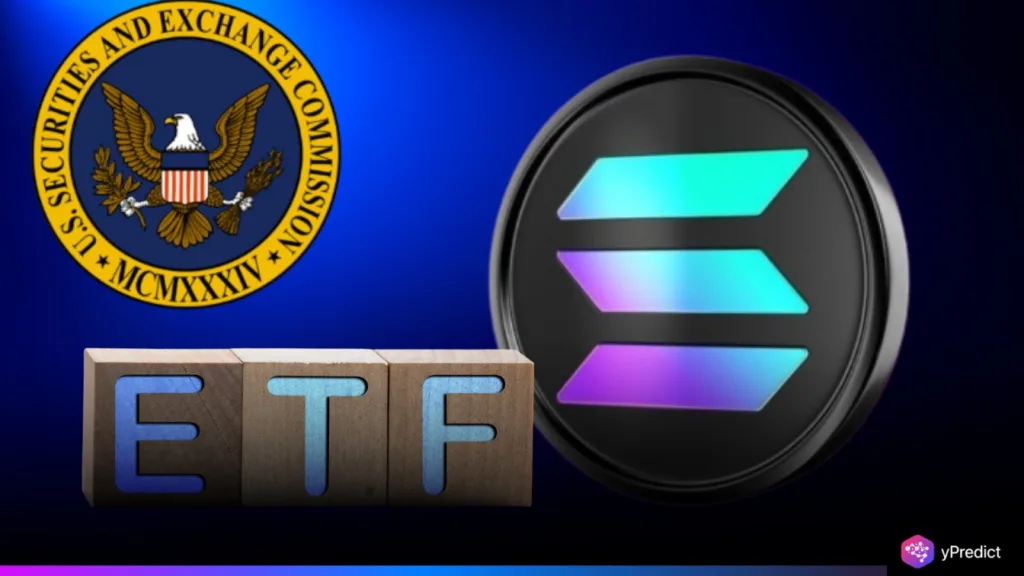
The U.S. Securities and Exchange Commission (SEC) has now publicly extended it’s decision on the Grain Scale Solana ETF until October 10, 2025. This postponement illuminates the mounting regulatory strain on crypto assets, particularly those associated with altcoins such as Solana (SOL). Grayscale’s push to convert its Solana Trust into an ETF began in April and has now become a litmus test for how U.S. regulators may treat Layer 1 blockchain tokens going forward.
The delay reflects not just technical hesitations but also deeper legal concerns under the longstanding Howey Test, a standard under renewed focus in the agency’s ongoing battles with Binance and Coinbase. AI-oriented platforms operating across the financial sector are monitoring this situation very closely and using machine learning capabilities to predict the likely outcomes based on precedent, political constraints, and the changing behaviors of the SEC.
SEC Pauses Grayscale Solana ETF Amid Legal Complexity
The source of the delay is that there are still legal questions that have not been resolved about whether Solana is a security or not. The SEC has continued to use the 1946 Howey Test, but its applicability to modern, decentralized blockchain tokens is disputed. This uncertainty intensified during the filing of a motion to dismiss in the ongoing SEC v. Binance and SEC v. Coinbase lawsuits where the SEC cited Solana along with other altcoins that could potentially be labelled as securities and therefore subject to securities law.
Grayscale’s ETF attempt marks one of the first serious regulatory encounters involving a Solana-based product. While the SEC previously rejected similar ETF filings, the acknowledgment of this application signals a subtle shift in approach. Yet the commission now appears in no rush to set precedent. AI monitoring systems tracking ETF approvals and denials have flagged this case as a major input for regulatory trend forecasting, especially about altcoin-linked ETFs.
High TPS and Energy Claims Face Regulatory Skepticism
Grayscale has positioned Solana’s performance strengths — high throughput of up to 65,000 transactions per second (TPS) and notable energy efficiency — as supportive points in the ETF conversion bid. The SEC has not publicly acknowledged such performance metrics in any of its ETF rulings to date. Analysts using AI-driven research models observe that the agency continues to prioritize legal classification and investor protection frameworks over network performance. For now, Grayscale’s emphasis on Solana’s speed and low environmental impact remains a secondary argument in the approval process.
Grayscale Solana Case Highlights Changing Regulatory Sentiment
Grayscale’s April filing comes during a volatile regulatory period. Crypto ETFs remain in limbo as the SEC applies inconsistent standards to different products. Some observers argue that the agency’s cautious acknowledgment of the Grayscale Solana application hints at a broader evolution in sentiment.
Behind the scenes, AI-driven legal analytics tools are actively scanning SEC communications, legal documents, and historical ETF decisions. These systems increasingly detect a regulatory tone shift, especially in altcoin treatment. Still, delays like this one suggest any real change will come slowly, and likely through court decisions rather than agency initiative.
AI Models Signal October as Pivotal for ETF Landscape
With the decision now rescheduled for October 10, 2025, AI models across fintech platforms are recalibrating ETF outlooks. The Grayscale Solana ETF case stands as a key indicator of how far U.S. regulators are willing to stretch existing legal definitions to accommodate a fast-evolving crypto market.
The SEC delay will continue to weigh on investor confidence in Solana-related financial products. At the same time that AI adoption is growing as a component in ETF risk modeling, as institutions utilize predictive tools to simulate various regulatory outcomes. For now, the October deadline is a hard inflection point for both Grayscale and the widespread efforts to put this all together for a crypto ETF.






